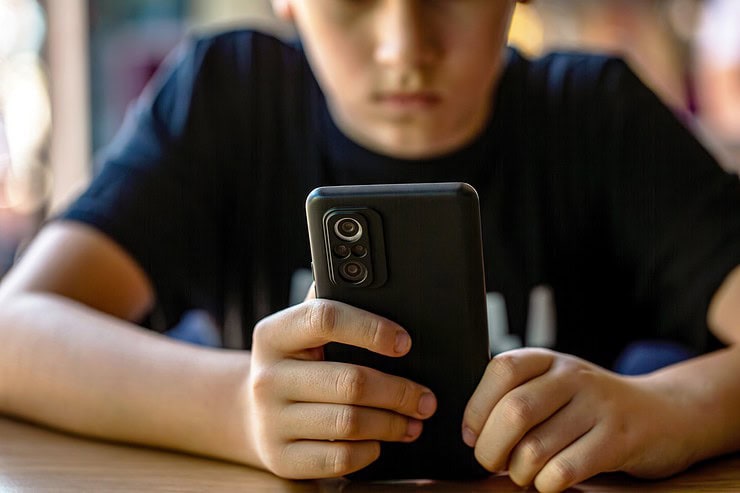Body image struggles affect boys too
Boys can become dissatisfied with their bodies when they compare themselves with others online, but adults can help

Tim, 15, used to love swimming. He felt strong, fast, and free in the water. But he couldn’t help but compare himself with fitness influencers on Instagram. Dissatisfied with his appearance, he began skipping meals, obsessively working out, and avoiding pool days with friends.
Tim’s story is just an illustration, but isn’t rare. Young people struggle with body image issues. A phenomenon, not new, but further accelerated by social media affecting girls and boys.
How social media affects boys
Social media doesn’t reflect reality. When boys scroll, they might see an endless stream of images that reflect impossible standards, thanks to filters, lighting, and editing apps. Boys who spend more time on Instagram say they feel pressure to look a certain way. When boys edit their photos, they are more anxious about their appearance. Just seeing a muscular image on Instagram can lower a boy’s body satisfaction, even if he has not internalized the ideal or compared himself directly.
“Boys who spend more time on Instagram say they feel pressure to look a certain way.”
Societal norms often tell boys to be tough, to avoid talking about their feelings, and to care about their performance, not their appearance. So when boys feel insecure, they don’t always show it or even realize it. Increasing numbers of boys are experiencing body image issues. Between 2007 and 2018, dissatisfaction among boys with being overweight rose by 46%, while dissatisfaction with thinness dropped by 24%, reflecting growing pressure for boys to be lean and muscular. Yet many still suffer in silence.
They may not say, “I feel ugly.” Instead, they might skip meals, avoid being photographed, hide their bodies, or develop a fitness mindset that’s more about punishment than self-care. This feeling of discontent and low body esteem can intensify, leading to disordered eating and obsessive workouts. In trying to reach an unrealistic ideal, some boys take protein or energy supplements, push their bodies too far in the gym, or turn to steroids, all in the hope of feeling better in their own skin. Such strategies, such as taking steroids, however, can cause long-term physiological risks such as organ failure and heart attack, as well as short-term psychological risks like uncontrolled anger outburst and depression when stopping use.
“They may not say, “I feel ugly.” Instead, they might skip meals, avoid being photographed, hide their bodies, or develop a fitness mindset that’s more about punishment than self-care.”
How can parents and educators support boys who use social media?
Tim’s parents eventually noticed that he had become quieter and more withdrawn. They asked questions – not in a judgmental way, but with genuine care. That helped Tim open up. His parents didn’t take away his phone but they helped him use it differently. Together, Tim and his parents began to follow social media accounts that promoted self-acceptance and showed real-life bodies. They talked about how Instagram isn’t real. Slowly, Tim started to feel better.
Here’s how adults can support boys like Tim:
• Start the conversation early. Don’t wait for problems to appear. Talk about social media, appearance, and pressure before these things become an issue.
• Ask curious questions. Try asking “What kind of content do you see most often?” or “How does it make you feel?” instead of making assumptions.
Show that it’s okay to care. Let boys know that feeling insecure doesn’t make them weak or less manly, and that talking about it takes strength.
• Focus on what bodies can do, not just on how they look. Celebrate energy, movement, and fun, and build self-esteem through what the body can achieve, rather than its appearance.
We need to change how we talk about body image with girls and boys. Social media shapes how boys see themselves and can cause quiet struggles that teens don’t yet have words for. Adults should give them the space to speak, and the support to know that they’re already enough, just as they are.
Further readings
• How does body dissatisfaction develop throughout adolescence and is it linked to BMI?
• How do adolescents process appearance-related content and what are their potential strategies to protect own body image perceptions?
• Did body image dissatisfaction grow in adolescents in recent years and which factors are associated with this change?
Footnotes
This article is part of a BOLD series of articles written by master’s students in Psychology from the University of Zurich in a seminar on ‘Risk and Protective Factors for Youth Mental Health’ taught and supervised by David Bürgin from the Jacobs Center for Productive Youth Development (JCPYD) of the University of Zurich in the Spring Semester 2025.





